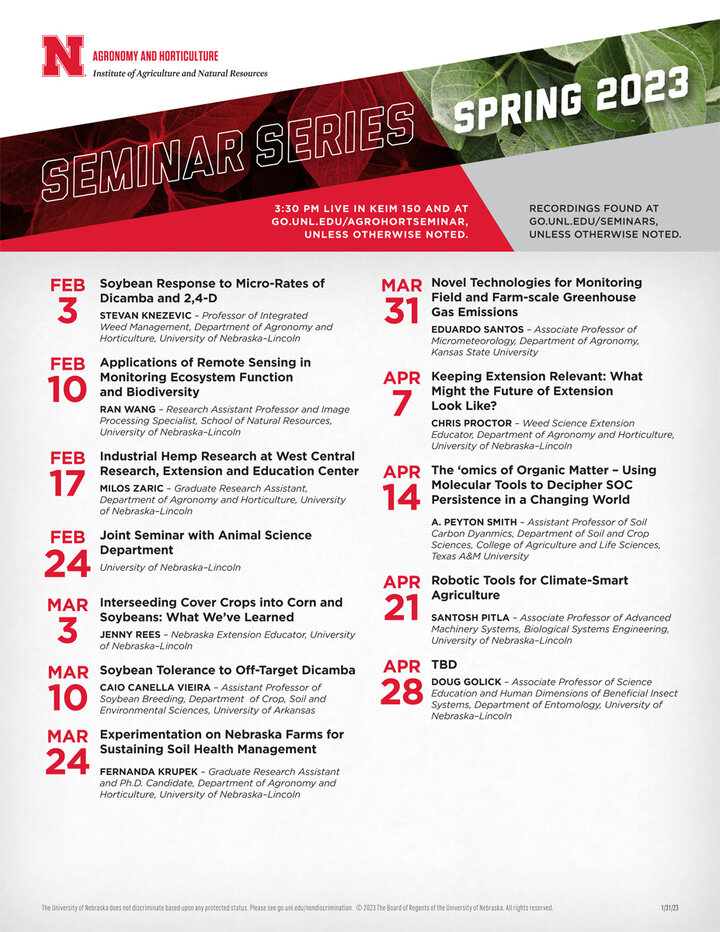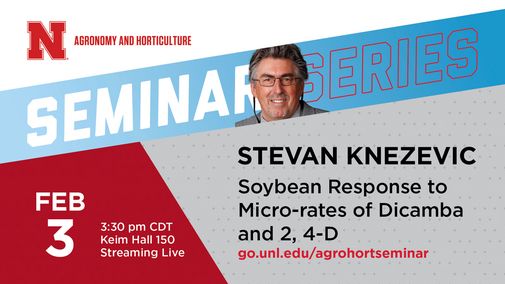The spring Agronomy and Horticulture seminar series begins with “Soybean Response to Micro-rates of Dicamba and 2, 4-D” presented by Nebraska’s Stevan Knezevic on Friday, Feb. 3.
Stevan Z. Knezevic, professor of agronomy and horticulture, will present on the off-target movement of dicamba and 2,4-D, a concern with the introduction of dicamba-tolerant (DT) and 2,4-D-tolerant (Enlist) soybeans in North America and elsewhere. Therefore, field studies were being conducted in Nebraska to evaluate glyphosate-tolerant (GT) soybean response to micro-rates (0, 1/1000th, 1/500th, 1/100th, 1/50th, 1/10th) of the label rates of dicamba and 2,4-D applied at V2, V7/R1 and R2 soybean growth stages. Both herbicides negatively influenced multiple growth parameters of GT soybeans including visual injury, plant height, physiological maturity as well as yield and yield components. In all cases, injuries and yield reductions from dicamba were significantly higher than those from 2,4-D for the same rate.
All seminars are free and open to the public. Seminars will be in person, streamed live via Zoom and recorded at 3:30 p.m. in Keim Hall, Room 150, unless otherwise noted.
Recordings of past seminars are also available in the Agronomy and Horticulture archives.

Dates and topics for the rest of the spring series are as follows:
Feb. 10
“Applications of Remote Sensing in Monitoring Ecosystem Function and Biodiversity,” Ran Wang, research assistant professor and image processing specialist, School of Natural Resources, University of Nebraska–Lincoln.
Feb. 17
“Industrial Hemp Research at West Central Research, Extension and Education Center,” Milos Zaric, graduate research assistant, Department of Agronomy and Horticulture, University of Nebraska–Lincoln.
Feb. 24
Joint seminar with Animal Science Department.
March 3
“Interseeding Cover Crops into Corn and Soybeans: What We’ve Learned,” Jenny Rees, Nebraska Extension educator, University of Nebraska–Lincoln.
March 10
“Soybean Tolerance to Off-Target Dicamba,” Caio Canella Vieira, assistant professor of soybean breeding, Department of Crop, Soil and Environmental Sciences, University of Arkansas.
March 24
“Experimentation on Nebraska Farms for Sustaining Soil Health Management,” Fernanda Krupek, graduate research assistant and Ph.D. candidate, Department of Agronomy and Horticulture, University of Nebraska–Lincoln.
March 31
"Novel Technologies for Monitoring Field and Farm-scale Greenhouse Gas Emissions," Eduardo Santos, associate professor of micrometeorology, Department of Agronomy, Kansas State University.
April 7
“Keeping Extension Relevant: What Might the Future of Extension Look Like?” Chris Proctor, weed science extension educator, Department of Agronomy and Horticulture, University of Nebraska–Lincoln.
April 14
"The 'omics of Organic Matter — Using Molecular Tools to Decipher SOC Persistence in a Changing World," A. Peyton Smith, assistant professor, Department of Soil and Crop Sciences, Texas A&M University.
April 21
"Robotic Tools for Climate-Smart Agriculture," Santosh Pitla, associate professor, Biological Systems Engineering, University of Nebraska–Lincoln.
April 28
Seminar to be determined — Doug Golick, associate professor of science education and human dimensions of beneficial insect systems, Department of Entomology, University of Nebraska–Lincoln.

